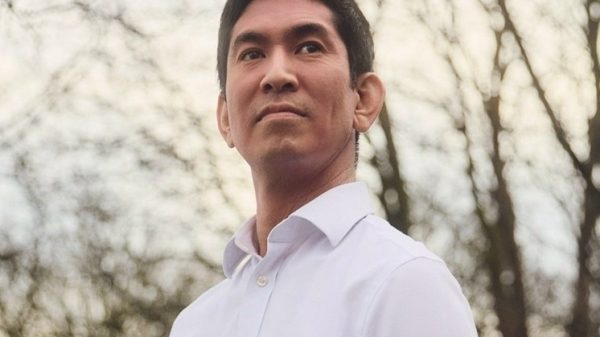 Jonathan Morgan was sacked by Sheffield United last month after admitting he was in a relationship while manager with a Leicester City player. Jess Hornby/Getty Images
Jonathan Morgan was sacked by Sheffield United last month after admitting he was in a relationship while manager with a Leicester City player. Jess Hornby/Getty Images
So often these days we celebrate milestones in women's football: sell-out crowds, record transfer fees, historic trophies… The first stadium built exclusively for a professional women's team was recently opened in the United States.< /p>
However, despite all the brilliant achievements, there are still many pressing issues, including in the relationship between player and coach, which has come under the spotlight in recent weeks. First came the news that Jonathan Morgan had been sacked from Sheffield United after it was revealed he had a relationship with a teenage player while at Leicester. Willie Kirk was then suspended by Leicester while an investigation into his alleged links to the player was carried out.
And these are not isolated cases. Telegraph Sport revealed the extent of player-coach relationships on Friday, revealing there have been at least 36 of them in the English football pyramid over the past three years. They involve both male and female trainers, but the women often cannot be named for legal reasons regarding the right to privacy regarding sexual life.
Such relationships are not prohibited, unless when they involve players under 18 years of age. And many by mutual consent. But how valid is this agreement when there is an imbalance of power? Coaches deal with selection, contracts, transfers. The players' career trajectory is in their hands. Additionally, these relationships influence team dynamics and culture, which in turn can impact performance.
This happens in any workplace. If Employee X is in a relationship with Manager Y, will he have priority over Employee Z for promotion? Did Employee A feel pressured to maintain a relationship with Manager B in order to keep his job?
This is why most organizations have strict policies regarding employee relations where there is an imbalance of power; they have a duty to provide a safe working environment, and turning a blind eye to potential abuses of power would be a breach of that duty.
“The game requires clear boundaries”
Women's football may still be entering the professional era, but clubs are like any workplace and therefore require a clear code of conduct that prohibits relationships between players and coaches (and others in positions of authority). There can be no blurring of boundaries, only clear boundaries, and that is why such relationships should be considered unacceptable.
As Aston Villa manager Carla Ward said last week: “Our job and our duty is to protect the players first and foremost. Therefore, crossing this line is unacceptable and cannot happen.
“It makes me very angry because we are here to create an environment, a comfortable place where people come to work, where they feel safe, where they feel supported and cared for. I just don’t understand anyone who crosses that line.”
Oxford University banned intimate relationships between students and staff last year and football must follow suit to protect players. Professionalism is as much about how things are done off the field as it is on it, and with players raising concerns about inconsistent advice on this issue across clubs, women's football clearly has some work to do.
' The poetic approach is not suitable. I help anyone'
The Football Association has said clubs must implement their own code of conduct, but perhaps it is time for the governing body or NewCo, which will take over the running of the Women's Super League and Championship in the summer, to put forward a strict policy that all clubs must follow. The current fragmented approach is not helping anyone.
And this is not just a problem for football: all sports, both men's and women's, must implement policies to prevent abuse of power. There should also be clear reporting structures to allow athletes to raise concerns.
Some relationships may well be «true love» where both parties are committed to a long-term commitment, but in this case either the player or coach must leave the club or switch roles, otherwise there will still be accusations of impropriety and conflict of interest.
Take Manchester United manager Mark Skinner, for example. He met his wife Laura Bassett, a former England international, at Birmingham City but «refused» to coach the first team while she was a player because he «didn't think it was ethical.» Discussing the player-coach relationship with BBC Sport in 2022, he said: «I don't think [it should happen] because of course the lines are blurred. How to maintain objectivity if, for example, you associate an emotional state with a relationship?
As for the relationship between the players, even Emma Hayes has since admitted that she shouldn't have called it «inappropriate.» Women's sports have long been a space of acceptance and inclusivity for same-sex relationships, and there is a lot to be said for how this openness has helped change attitudes in society.
It would be naive to say that having couples on a team is a no-brainer: what if the relationship breaks down? What if they are competing for the same position? What if one player wants to change clubs? But the homophobic backlash from some quarters threatens the very inclusivity that is so integral to women's sport. One half of the first same-sex couple to win Olympic gold, former British hockey player Kate Richardson-Walsh said, The Athletic wrote : “Comments like this can send people underground again. They can turn sexuality into table conversation. It makes it a secret, and it makes sexuality everything we think of as secrets. They are dirty. They are wrong. This is inappropriate. How can you create a sense of belonging in any team if a person feels that he cannot be himself?






















































Свежие комментарии